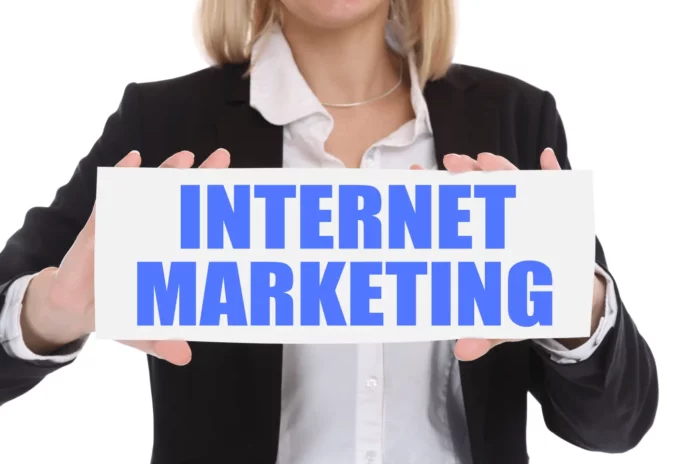In the wide field of digital marketing, internet marketing stands as a fundamental strategy for businesses aiming to thrive in the online landscape.
Understanding the essence of Internet marketing is important for brands seeking to leverage the vast opportunities presented by the Internet world.
This article provides a comprehensive exploration of Internet marketing, unraveling its fundamentals, strategic advantages, and evolving trends.
Whether you’re a seasoned marketer navigating the ever-changing digital landscape or a business owner looking to expand your online presence, this blog post on internet marketing aims to provide actionable insights in leveraging various online channels, such as websites, email marketing, social media, and search engines, to reach and engage your target audience effectively.
By the end of this article, you’ll not only understand the fundamentals of Internet marketing but also gain practical strategies to optimize your online efforts and achieve measurable success in the competitive Internet world.
What Is Internet Marketing?
Internet marketing, also known as online marketing, refers to the marketing strategy that leverages Internet channels to promote and sell products or services.
It encompasses various strategies such as social media marketing, content marketing, email campaigns, SEO, and paid advertising.
Internet marketing harnesses the power of the internet to reach a wide audience, engaging potential customers across websites, social platforms, and search engines.
It focuses on creating compelling online experiences, enhancing brand visibility, driving traffic, and ultimately converting leads into customers.
This dynamic and multifaceted approach adapts to evolving technology and consumer behaviors to maximize online presence and achieve marketing objectives.
Why Is Internet Marketing Important?
Here is why Internet marketing is important:
1. Constant Online Presence On The Internet.
Maintaining a continuous online presence is essential in today’s digital landscape.
Internet marketing ensures that businesses are always accessible to potential customers, irrespective of time zones or geographical locations.
Through websites, social media platforms, and various online channels, companies establish a 24/7 presence, allowing customers to engage, inquire, or make purchases at their convenience.
This constant visibility nurtures brand recognition, trust, and customer loyalty, playing a pivotal role in staying ahead in a competitive market where online presence is a cornerstone of success.
2. Sell Your Products And Services Online.
The internet has revolutionized commerce, enabling businesses to showcase and sell their products or services to a vast online audience.
Through e-commerce platforms, digital storefronts, or online marketplaces, internet marketing facilitates seamless transactions, providing customers with the convenience of browsing and purchasing from anywhere at any time.
This capability to conduct business online not only expands market reach but also opens new revenue streams, making it imperative for businesses to capitalize on Internet marketing for sustained growth.
3. Cost-Effectiveness.
Compared to traditional marketing methods, internet marketing offers a cost-effective approach for businesses of all sizes.
Digital marketing tools and platforms often come with lower entry barriers, allowing even small businesses to compete on a global scale within reasonable budgets.
Moreover, targeted online advertising, social media promotions, and email campaigns enable precise audience segmentation, optimizing spending and maximizing returns.
This cost-effectiveness ensures that marketing efforts yield significant results without exorbitant expenses.
4. Global Reach.
One of the paramount advantages of Internet marketing is its ability to transcend geographical boundaries.
Businesses can extend their reach beyond local markets and access a global audience.
Strategic use of SEO, content marketing, and targeted advertising helps penetrate diverse markets worldwide.
This global outreach not only fosters brand exposure but also unlocks opportunities for international expansion and growth, making internet marketing indispensable for businesses eyeing a global presence.
5. Instant And Highly Measurable Results.
Unlike traditional marketing, internet marketing offers instant and measurable results.
Analytical tools provide real-time insights into campaign performance, website traffic, conversion rates, and customer engagement.
This immediacy allows businesses to adapt strategies on the fly, optimizing campaigns for maximum impact.
The ability to measure and analyze results in real-time empowers marketers to make data-driven decisions, ensuring that resources are allocated efficiently for optimal outcomes.
6. High Return On Investment (ROI).
The measurable nature of Internet marketing enables businesses to track and quantify their return on investment accurately.
By analyzing key performance indicators, businesses can assess the effectiveness of their marketing strategies and channels.
The ability to identify high-performing tactics and allocate resources accordingly ensures that marketing budgets are utilized for maximum ROI.
This transparency and ability to attribute results directly to marketing efforts make Internet marketing a highly favorable and rewarding avenue for businesses seeking substantial returns.
7. Straight Real-Time Communication Route Between You And Your Client.
Internet marketing facilitates direct and instantaneous communication between businesses and their clients.
Through social media, live chat features, email, and interactive content, companies can engage with customers in real-time.
This direct communication not only fosters relationships and builds trust but also allows businesses to address customer concerns promptly, enhancing overall customer satisfaction.
This immediate and transparent interaction strengthens the bond between businesses and their clientele, establishing a responsive and customer-centric approach.
8. Highly Targetable.
Internet marketing allows for precise targeting of specific demographics, interests, behaviors, and locations.
Through advanced targeting options in digital advertising platforms, businesses can tailor their messages to reach the most relevant audience segments.
This high level of targeting ensures that marketing efforts resonate with the intended audience, increasing the likelihood of engagement and conversions.
The ability to reach the right audience with tailored content makes Internet marketing an invaluable tool for efficient and effective marketing campaigns.
9. Personalization Capabilities.
Personalization is a key factor in modern marketing, and the Internet provides the tools necessary for personalized communication.
By leveraging customer data and behavior, businesses can deliver customized experiences, content, and recommendations to individual customers.
Personalization goes beyond addressing customers by name; it involves understanding their preferences and providing tailored solutions.
This personalized approach enhances engagement, builds stronger connections, and cultivates customer loyalty, making Internet marketing an essential strategy for nurturing lasting relationships with customers.
10. Easy And Convenient Conversions.
Internet marketing streamlines the conversion process, making it seamless and convenient for customers to take desired actions.
Whether it’s making a purchase, signing up for a newsletter, or filling out a form, optimized user experiences across online platforms facilitate easy conversions.
Clear call-to-action buttons, user-friendly interfaces, and simplified checkout processes enhance the customer journey, increasing conversion rates.
The ease of conversion in Internet marketing contributes significantly to a positive customer experience, ultimately driving business growth and success.
What Are The Popular Internet Marketing Strategies?
Here are some of the popular Internet marketing strategies:
1. Blogging.
Blogging is a great internet marketing strategy, offering a platform to share valuable and informative content regularly.
Through blog posts, businesses can address industry trends, provide solutions to common problems, offer insights, and establish thought leadership within their niche.
Blogs serve as a hub for quality content, driving traffic to websites through SEO-optimized articles and attracting a loyal readership.
By consistently delivering relevant and engaging content, businesses can nurture relationships with their audience, encourage interaction, and establish credibility, ultimately driving conversions and brand loyalty.
2. Affiliate Marketing.
Affiliate marketing involves collaborating with affiliates or partners who promote products or services in exchange for a commission on sales.
Affiliates utilize various channels such as websites, blogs, social media, or email marketing to drive traffic and conversions to the business.
This performance-based marketing model benefits both parties—the business gains increased visibility and sales without upfront costs, while affiliates earn commissions for successful referrals.
Effective affiliate marketing programs rely on building relationships with reliable affiliates, providing them with compelling promotional materials, tracking performance metrics, and offering fair incentives to drive conversions.
3. Search Engine Optimization (SEO).
SEO remains a cornerstone of online marketing strategies. It focuses on optimizing a website’s visibility in search engine results organically.
This involves enhancing various aspects like on-page content, keyword research, meta descriptions, and HTML tags to improve a website’s ranking on search engine results pages (SERPs).
Quality content creation plays a pivotal role in SEO, aiming to provide value to users while incorporating relevant keywords strategically.
Additionally, link building—acquiring high-quality backlinks from reputable websites—enhances a site’s authority and visibility.
SEO strategies constantly evolve due to search engine algorithm updates, emphasizing user experience, mobile-friendliness, and relevant, authoritative content to rank higher in search results.
4. Content Marketing.
Content marketing revolves around creating and distributing valuable, relevant, and consistent content to attract and engage a target audience.
The content can be blog posts, articles, videos, infographics, podcasts, and more.
The primary goal is to offer valuable information, entertain, or educate the audience while subtly promoting products or services.
Effective content marketing involves understanding the target audience’s preferences, pain points, and interests to tailor content that resonates with them.
Distributing content across multiple channels, such as social media platforms, websites, email newsletters, and guest posting on authoritative sites, amplifies its reach and impact.
Engaging and shareable content not only attracts new prospects but also nurtures existing customer relationships, fostering trust and loyalty.
5. Social Media Marketing.
Social media marketing leverages social platforms like Facebook, Instagram, Twitter, LinkedIn, and others to reach and engage with a target audience.
It involves creating compelling content tailored for each platform, engaging with followers, running targeted advertisements, and analyzing metrics to refine strategies.
The key is understanding each platform’s demographics and user behavior to craft relevant content and engage effectively.
Paid advertising on social media allows precise targeting based on demographics, interests, behaviors, and more, maximizing the reach and impact of marketing campaigns.
Building a community, fostering conversations, and providing value through social media content contribute to brand visibility, customer loyalty, and increased conversions.
6. Email Marketing.
Email marketing remains a powerful tool for nurturing leads, retaining customers, and driving conversions.
It involves sending targeted and personalized emails to a subscriber list, delivering valuable content, promotions, updates, and relevant information.
Effective email marketing focuses on segmentation and personalization, ensuring that the content resonates with recipients based on their preferences and behavior.
Automation tools allow marketers to create drip campaigns, trigger-based emails, and targeted sequences, streamlining communication and engagement with subscribers.
Analyzing open rates, click-through rates, and conversions helps refine strategies for better engagement and higher ROI.
7. Influencer Marketing.
Influencer marketing involves collaborating with individuals who have a significant following and influence within a specific niche or industry.
These influencers promote products or services to their engaged audience, leveraging their credibility and trust to drive brand awareness and conversions.
Collaborations can range from sponsored posts, product reviews, endorsements, to brand partnerships.
Identifying the right influencers whose values align with the brand and resonate with the target audience is crucial for successful campaigns.
Authenticity and transparency in partnerships are key to building trust and credibility with the audience, leading to effective influencer marketing campaigns.
8. Pay-Per-Click Advertising (PPC).
PPC advertising allows marketers to display ads on search engines or other platforms and pay a fee each time the ad is clicked.
Platforms like Google Ads and Bing Ads offer advertisers the ability to bid on keywords relevant to their target audience.
Advertisers can create highly targeted campaigns, control budgets, and track performance metrics in real-time.
Display ads, text ads, remarketing campaigns, and shopping ads are among the various formats available in PPC advertising.
Successful PPC campaigns require thorough keyword research, compelling ad copy, effective bidding strategies, and continuous optimization to maximize ROI and conversions.
9. Video Marketing.
Video marketing has surged in popularity, offering an engaging and versatile way to connect with audiences.
Platforms like YouTube, TikTok, Instagram, and Facebook are ideal for sharing video content.
Brands utilize videos for various purposes, including product demonstrations, tutorials, behind-the-scenes glimpses, testimonials, and storytelling.
Video content allows for creativity and authenticity, enabling brands to convey messages effectively and evoke emotions.
Live streaming has also gained traction, offering real-time interaction and engagement with audiences.
With the increasing consumption of video content, businesses can leverage this medium to boost brand visibility, engagement, and conversion rates.
10. Search Engine Marketing (SEM).
SEM encompasses paid advertising strategies to increase a website’s visibility in search engine results through paid advertisements.
While PPC (Pay-Per-Click) advertising is a key component of SEM, it also includes other paid search initiatives like display advertising, remarketing, and shopping ads.
Businesses bid on keywords relevant to their products or services, and ads are displayed to users searching for those terms.
SEM allows for precise targeting, ad customization, and real-time performance tracking, enabling marketers to optimize campaigns for better ROI.
Combined with SEO efforts, SEM can enhance a brand’s online presence, drive immediate traffic, and boost conversions by reaching potential customers actively searching for related products or services.
How To Do Internet Marketing?
Here are the steps to start Internet marketing:
1. Define Your Goal.
Begin by defining clear and specific goals for your internet marketing strategy.
Whether it’s increasing website traffic, generating leads, boosting sales, or enhancing brand awareness, setting SMART (Specific, Measurable, Achievable, Relevant, Time-bound) goals provides direction.
Each goal should align with your overall business objectives, guiding your marketing efforts towards measurable outcomes.
For instance, if the goal is to increase sales, strategies might focus on optimizing conversion rates, targeting specific audience segments, or launching promotional campaigns aimed at driving purchases.
2. Find Your Target Audience.
Identifying your target audience is crucial in Internet marketing.
Conduct thorough market research to understand the demographics, preferences, behaviors, and pain points of your potential customers.
Develop detailed buyer personas to accurately represent your target audience segments.
This understanding allows you to tailor your content, messaging, and advertising efforts to resonate with specific audience groups.
By aligning your marketing strategies with the needs and interests of your target audience, you can significantly increase engagement and conversion rates.
3. Decide On A Platform.
Choosing the right platforms is essential to effectively reach your target audience.
Different platforms cater to various demographics and user behaviors.
Consider the nature of your business, the type of content you’ll be sharing, and where your audience is most active.
Whether it’s social media platforms like Facebook, Instagram, LinkedIn, or content-driven platforms like YouTube or blogging sites, select the platforms that align with your marketing goals and resonate with your audience.
4. Develop a Comprehensive Strategy.
Craft a holistic and comprehensive internet marketing strategy that integrates various digital channels cohesively.
Your strategy should encompass content creation, SEO, social media marketing, email campaigns, and paid advertising.
Each component of the strategy should align with your defined goals and target audience.
A well-thought-out strategy allows for synergy between different marketing tactics, ensuring a unified and effective approach toward achieving your objectives.
5. Manage Your Budget.
Budget management is critical in Internet marketing.
Determine a realistic budget allocation based on your goals, audience, and chosen platforms.
Allocate funds for advertising, content creation, tools, and any additional expenses.
Regularly monitor and adjust your budget as needed based on the performance of campaigns and the return on investment (ROI).
Prioritize high-impact areas while ensuring that resources are distributed sensibly across various marketing initiatives to maximize outcomes within your financial constraints.
6. Balance Between Free And Paid Digital Services.
Leverage a mix of free and paid digital services to optimize your internet marketing strategy.
While paid advertising can offer immediate visibility, organic methods like content marketing, SEO, social media engagement, and email campaigns can significantly impact brand visibility without direct expenses.
Striking a balance between these approaches ensures sustainable growth and long-term success while making the most of available resources.
7. Optimize For Mobile.
Incorporate mobile optimization into your internet marketing strategies.
With an increasing number of users accessing content via mobile devices, optimizing your website, emails, advertisements, and content for mobile responsiveness is crucial.
Ensuring a seamless user experience across various devices and screen sizes not only improves engagement but also positively impacts search engine rankings, as search engines prioritize mobile-friendly content.
8. Keyword Research.
Keyword research is foundational for effective SEO and content creation.
Find the keywords and phrases that your audience uses to search for products or services like yours.
Tools like Google Keyword Planner, SEMrush, or Ahrefs can assist in discovering high-value keywords with optimal search volumes and competition levels.
Integrating these keywords strategically into your website content, blog posts, and advertising campaigns enhances visibility, driving organic traffic and improving search engine rankings.
9. Iterate Based On Measurable Analytics.
Regularly analyze the performance of your internet marketing campaigns through analytics.
Metrics like website traffic, engagement, click-through rates, and conversion rates offer valuable insights.
Use tools like Google Analytics or social media analytics to track and interpret these data points.
By reviewing analytics, you can identify strengths, weaknesses, and areas for improvement, allowing you to refine your strategies and optimize future campaigns for better results.
10. Analyze, Optimize, and Adapt.
Continuously analyze the effectiveness of your internet marketing efforts.
Assess the impact of your strategies against predefined goals and KPIs.
Based on the analysis, optimize your campaigns by adjusting elements such as content, targeting, ad formats, and timing.
Adapt your strategies based on changing market dynamics, emerging trends, and evolving consumer behaviors.
This iterative process of analysis, optimization, and adaptation ensures that your internet marketing efforts remain relevant, effective, and aligned with your business objectives.
Some Tips To Help You To Become A Successful Internet Marketer.
Here are some tips to help you become a successful internet marketer:
1. Know Your Audience.
Understanding your audience is the bedrock of successful Internet marketing.
Delve deep into the demographics, behaviors, preferences, and pain points of your potential customers.
Create detailed buyer personas to better grasp their needs and motivations.
This knowledge empowers you to tailor marketing strategies that resonate with specific audience segments.
When you intimately understand your audience, you can craft personalized and targeted campaigns that genuinely connect, fostering stronger relationships and higher engagement.
2. Create High-Quality and Relevant Content.
The cornerstone of effective Internet marketing lies in creating content that captivates and adds value.
Focus on delivering content that educates, entertains, or solves problems for your audience.
Whether it’s articles, videos, infographics, or podcasts, prioritize quality over quantity.
Engage your audience with compelling storytelling, practical insights, and relevant information.
Meaningful and high-quality content not only attracts attention but also establishes credibility and trust, positioning you as an authority in your niche.
3. Tailor Your Content.
Customize your content to suit different platforms and audience segments.
Each platform has its unique audience demographics and preferences.
Tailor your content style, tone, and format to fit the platform you’re using, be it concise and impactful for social media or comprehensive and informative for blog posts.
Additionally, personalize your content to cater to various buyer personas within your target audience.
Tailoring content ensures maximum relevance and resonance, amplifying engagement and conversion rates.
4. Leverage Social Media Platforms Effectively.
Utilize social media platforms strategically to engage with your audience.
Determine which platforms your target audience is most active on and tailor your content accordingly.
Foster genuine interactions, respond to comments and messages promptly, and create meaningful conversations.
Leverage social media advertising to reach specific demographics, amplify your reach, and drive targeted traffic to your website or landing pages.
Building an active and engaged community on social media contributes significantly to brand visibility and customer loyalty.
5. Embrace Email Marketing and Automation.
Email marketing remains a powerful tool for nurturing leads and engaging customers.
Craft personalized and targeted email campaigns based on customer behavior, preferences, and lifecycle stages.
Implement automation to send relevant content, personalized recommendations, and follow-ups, enhancing customer relationships and driving conversions.
Email marketing, when done effectively, allows you to deliver timely and tailored messages that resonate with your audience, boosting engagement and retention rates.
6. Search Engine Optimization (SEO).
Master the fundamentals of SEO to enhance your online visibility and ranking on search engine results pages (SERPs).
Conduct thorough keyword research to understand user intent and optimize your content accordingly.
Focus on both on-page and off-page SEO elements, including meta tags, backlinks, and user experience.
A robust SEO strategy improves organic traffic, boosts brand credibility, and positions your content higher in search engine rankings, increasing visibility to your target audience.
7. Measure and Analyze Performance Metrics.
Regularly analyze the performance of your internet marketing campaigns through metrics like website traffic, conversion rates, engagement, and click-through rates.
Utilize tools like Google Analytics to track and interpret these data points.
Evaluating performance metrics offers valuable insights into the effectiveness of your strategies, enabling you to identify strengths, weaknesses, and areas for improvement.
Data-driven decision-making allows for continual optimization and refinement of marketing efforts.
8. Optimize for Mobile Experience.
In today’s mobile-centric world, optimizing your online presence for mobile devices is imperative.
Ensure your website, emails, and content are mobile-responsive, providing a seamless user experience across different devices and screen sizes.
Mobile optimization not only improves user engagement but also positively impacts search engine rankings, as search engines prioritize mobile-friendly content.
Tailoring your strategies for mobile users enhances accessibility and responsiveness, catering to the preferences of a diverse and mobile-oriented audience.
9. Cultivate Authenticity and Build Trust.
Authenticity and trust are paramount in Internet marketing.
Be transparent, genuine, and consistent in your brand messaging and interactions.
Engage authentically with your audience, respond to feedback, and address concerns openly.
Building trust fosters lasting relationships with customers, increasing brand loyalty and advocacy.
Authenticity in your marketing endeavors creates a strong foundation for sustained success.
10. Foster a Community and Engagement.
Create a sense of community around your brand by encouraging interactions and fostering engagement.
Start conversations, hold live events, and encourage user-generated content.
Engage with your audience through polls, contests, and Q&A sessions.
Fostering a community not only strengthens brand loyalty but also amplifies brand advocacy, as satisfied customers become brand advocates, promoting your business organically.
11. Focus on Customer Experience and Feedback.
Prioritize delivering exceptional customer experiences across all touchpoints.
Collect and act on customer feedback to improve products, services, and overall experiences.
Personalize interactions, address queries promptly, and strive to exceed customer expectations.
A positive customer experience contributes significantly to brand perception, loyalty, and advocacy, crucial elements in internet marketing success.
12. Be Flexible.
Flexibility is crucial in navigating the ever-evolving landscape of Internet marketing.
It involves the readiness to adapt strategies, tactics, and approaches based on emerging trends, market shifts, or new insights.
Being flexible allows marketers to pivot swiftly, seize emerging opportunities, and address challenges effectively.
It’s about embracing change, experimenting with new ideas, and optimizing strategies to remain responsive to evolving consumer behaviors and industry developments.
13. Be Consistent.
Consistency in Internet marketing is more than just maintaining a regular posting schedule.
It encompasses delivering a unified brand voice, message, and quality across all channels consistently.
Consistency builds credibility, reliability, and trust with your audience.
It strengthens your brand’s identity by making it more recognizable and memorable.
By consistently meeting audience expectations with quality content and experiences, businesses establish a strong foundation for lasting relationships with their customers.
14. Personalize.
Personalization in Internet marketing involves leveraging customer data and insights to tailor experiences, content, and recommendations for individual consumers.
It goes beyond addressing customers by name; it’s about understanding their preferences, behaviors, and needs to deliver highly relevant and targeted interactions.
Personalized marketing efforts enhance customer engagement, loyalty, and satisfaction, leading to increased conversions and long-term relationships with customers.
15. Prioritize Continuous Learning and Adaptation.
In the fast-paced world of Internet marketing, ongoing learning and adaptation are imperative.
Prioritizing continuous learning involves staying updated on industry trends, new technologies, and evolving best practices.
It includes attending workshops, courses, and industry conferences to acquire new skills and insights.
Adaptation is equally crucial, as it involves applying newfound knowledge and insights to refine strategies and stay ahead in a constantly changing digital landscape.
16. Long-Term Focus.
A long-term focus in Internet marketing involves cultivating strategies and approaches that prioritize sustainable growth and relationships over immediate results.
It’s about nurturing brand equity, fostering trust, and building enduring relationships with customers.
Instead of short-term gains, a long-term focus involves investing in initiatives that yield lasting results, focusing on brand loyalty, and consistently delivering value to customers.
17. Stay Ethical and Compliant.
Ethical and compliant practices are foundational in Internet marketing.
It involves respecting user privacy, honoring opt-in/opt-out preferences, and complying with industry regulations and standards.
Adhering to ethical principles ensures transparent and trustworthy interactions with customers.
It not only safeguards your brand reputation but also fosters credibility and trust, nurturing positive relationships with your audience while promoting a responsible and respectful approach to marketing endeavors.
Conclusion.
Internet marketing remains the cornerstone of modern business strategies, offering unique opportunities to reach and connect with global audiences.
Throughout this article, we have discussed in depth the multidimensional field of Internet marketing, which covers diverse strategies such as blogging, affiliate marketing, social media marketing, search engine optimization (SEO), email marketing, and more.
By adopting Internet marketing techniques, businesses can enhance their online presence, drive targeted traffic, and develop meaningful relationships with customers.
As algorithms evolve and consumer behavior changes, it is important to adapt and stay informed about emerging trends.
Investing in Internet marketing ensures a competitive edge in the digital landscape, leading to business growth and success.







